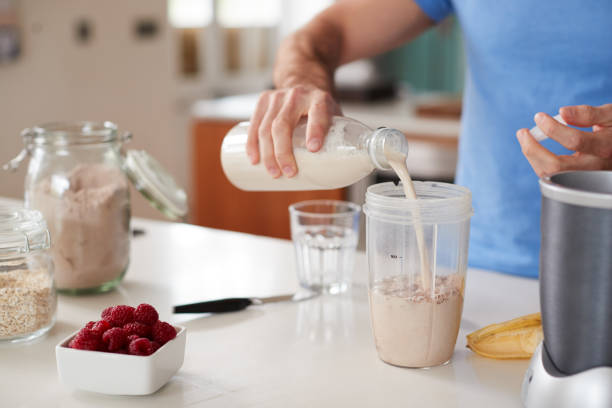It’s difficult to deny the rising popularity of protein shakes these days. There was a time when the only people who used protein powder were the elite athletes and the hardcore bodybuilders.
Today, it’s a mainstream product. More people are aware of the importance of adding protein to their diets, as it helps with both musclebuilding and weight loss. One recent study found that almost half of all adults in the US (46%, to be exact) admitted to regularly consuming protein shakes and drinks.
Some of them are undoubtedly the same folks you see lifting weights at your local YMCA gym. They need protein for their muscles to get bigger. With protein shakes, they get cleaner protein than the protein they can get from a local burger joint, as those burgers also come with bad stuff like saturated fat, trans fat, and lots of sodium and calories.
Plenty of vegetarians also drink protein shakes, since the most common sources of protein are actually animal meat and products such as beef, turkey, chicken, fish, and dairy. Vegans really need protein shakes, since they can’t get their protein from an everyday breakfast staple such as eggs.
But to optimize your habit of drinking protein shakes, you should do it properly. That’s not always easy, as even professional athletes can make mistakes regarding their protein shake consumption. So, here’s a guide on the most common mistakes people commit with their protein shakes.
Going with the Cheap Protein Powder
Chances are, you’re probably old enough to have heard this saying: “You get what you pay for”. Basically, you pay low prices and you’re getting low quality. It’s a truism that applies to a wide range of consumer items, and these include protein powder.
You want the good stuff, then you should be prepared to pay somewhat higher prices. A protein powder that comes with a suspicious bargain price (and often, a long shelf life as well) should raise your internal alarms. In all likelihood, you’re getting a protein powder that also loads you up with too much carbs and fat.
So, just pay the higher prices for the good stuff, such as for whey isolate protein. It gives you higher-quality protein without the unneeded additives. The good stuff should get you 20 to 25 grams of protein per scoop.
Try to get protein powder that’s also loaded with leucine and BCAAs. You need 3g of leucine to stimulate muscle protein synthesis and growth. BCAAs are also important for muscle growth.
You’re Overloading on the Wrong Ingredients
Okay, so you have milk and then you just put in your protein powder there. But then you get the idea of adding some almond butter as well. And then you think about putting in some dried fruit, too. That couldn’t hurt, right?
The problem here is that you’re just increasing the calorie intake without actually getting any extra benefits. What you need to do is to go with low-sugar ingredients, so you’re getting the protein without the extra calories.
You can go with 500ml of milk, 3g of beta alanine, 1 banana, and 150mg of caffeine for a pre-workout drink. For breakfast, you can combine 300ml of water, 2 or 3 ice cubes, 1 tablespoon of peanut butter, 100g of strawberries, 200g of low-fat Greek yogurt, and a handful of raw spinach into your breakfast.
You’re Putting in Too Much Protein Powder
It doesn’t matter if you’re putting in the same amount of protein powder as your favorite professional athlete. Your needs are different.
Basically, you want perhaps 1.5 to 2 grams of protein for every kilogram you weigh if you’re trying to build bigger muscles. On the average, the average US male adult weighs approximately 90 kilos. So, he needs 135 to 180g of protein per day if he needs to bulk up.
But if he’s just trying to remain healthy, then he only needs 0.8g of protein for each kilo of bodyweight. That’s just 72g of protein for the day.
Keep track of your protein consumption for the whole day. If you eat bacon and eggs for breakfast, a burger for lunch, and a chicken breast (or 2) for dinner, then you might not even need the protein shake for the day.
You’re Replacing Entire Meals with Protein Shakes
This is a mistake, since protein shakes don’t contain as many of the nutrients you need as a proper meal. Also, the protein shakes won’t fill you up, so you’re liable to eat more later on.
Eat properly, and don’t forget that protein shakes are supplements!
